LG brings brighter OLED TVs and a sequel to the C1 and G1 OLEDs to CES 2022
The electronics giant brings 97-inch 4K, smaller 42-inch model and new AI image processing to CES 2022
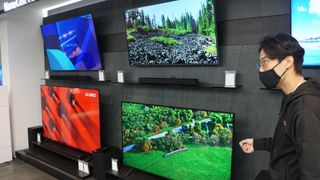
New processors, better blacks, reformulated panels, and new boundary-stretching sizes are all in store for LG’s 2022 OLED, QNED, and UHD TV lineup, which it introduced here at CES 2022 in Las Vegas.
LG’s OLED line has come a long way since the first 55-inch panel was unveiled for an eye-popping $11,999. Now the market is filled with 4K TVs for well under $500 and stiff competition in the still-premium OLED TV space.
In its quest to hold onto what may be a narrowing lead, LG gave TechRadar an early look at a range of big-screen, high-resolution displays featuring brilliant colors, inky blacks, and stunning detail.
(If you want to see everything LG is announcing, our LG CES 2022 live blog will give you all the answers you crave).
Meet the all-new C2 and G2 Gallery Edition OLED TVs
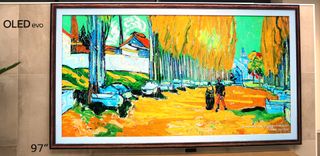
LG’s OLED evo line will feature a new 97-inch G2 4K display. While not the biggest panel we’ve seen, it is formidable and with impressive imagery. As they talked through key specs, the panel ran through a collection of masters' artwork in faux frames that looked just a paint-stroke away from the real thing.
At the other end of the spectrum is the new 42-inch LG42C2 4K OLED panel, which might be especially attractive to gamers looking for small, room-friendly panels that don’t skimp on image quality driven by the latest console systems.
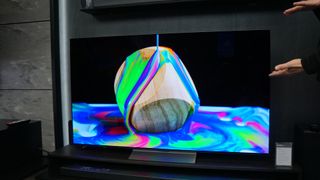
Much of the technology behind these panels is changing with new brightness booster technology in the Gallery line of OLED evo panels - thanks, largely, to a new heat dissipation system - and all the high-end displays feature LG’s new Alpha 9 (a9) Gen. 5 processor.
Get daily insight, inspiration and deals in your inbox
Sign up for breaking news, reviews, opinion, top tech deals, and more.
The a9 adds AI upscaling to instantly take sub-4K imagery up to full 4K resolution. Tone mapping is now applied to 5,000 zones (it was just 576 previously), and there’s a new AI object enhancement to help properly separate the foreground from backgrounds in imagery.
The system is also boosting audio to a virtual up-mix of 7.1.2 surround sound, up from 5.1 last year. Thin panel displays offer notoriously bad audio, and LG would be happy to sell you a new soundbar to augment that aural reality, but not everyone wants to buy more hardware, which is why LG is always working on improving the sets’ native audio chops.
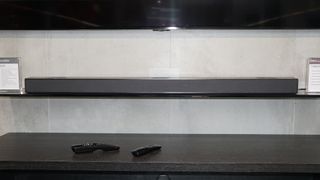
LG is also unveiling a new soundbar that adds an up-firing speaker on top that significantly boosts voices. I generally can’t stand how muddled the direct audio is from my HDTVs and am always struggling to hear the voices. This roughly 3-ft wide box did an excellent job of elevating the speech above a cacophony of action in the abysmal Batman vs. Superman.
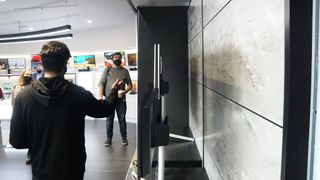
There are some chassis upgrades as well. The high-end G2 line gets a more consistent panel thickness that slims the thicker bottom third of the screen to make the entire panel a more consistent width. The benefit here is that the entire display will now sit flush against the wall—more like the hanging picture frame it’s supposed to be mimicking.
The C2 line now features a new composite fiber material frame that LG claims make the entire set half the weight of last year’s C1 set. That’s good news for those mounting these to the wall on their own.
All the new OLEDs, except the A2 models, are now capable of a 120Hz refresh rate, making them great for gamers.
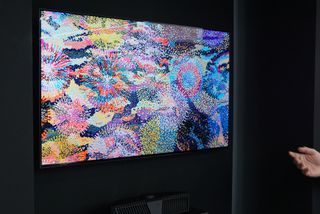
webOS has a new name and the cinema-sized Z2 OLED
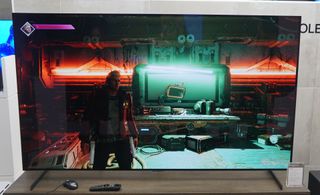
LG isn’t slowing down on 8K OLED display development. I saw an incredible 88-inch Z2 model where I almost had to put my nose against the display to detect the pixels (on the 97-inch 4K display, I could detect them at about an inch away). We also got a look at LG’s new 77ZX 8K gaming display. It’s NVIDIA G-Sync compatible and supports HMDMI 2.1’s full 48 Gbps throughput. The company connected it not to a console, but a powerful gaming PC and let us spend a few moments playing a video game on the screen. It looked good but I can’t say I really noticed the difference between gaming on it and, say, a larger 4K display.
LG’s display technology upgrades are not just about image quality. The company is crafting a few fascinating updates that could appeal to consumers who may be less concerned about image quality.
The new line of sets will support Always Ready, where they can run in an ambient light mode, rotating art (I saw a lot of that during our demos), a clock, or your own photos.
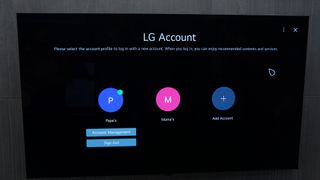
LG’s smart TVs all run WebOS, now renamed WebOS 22 (for the year). The platform is getting a few updates, including the ability to add user profiles. Users will log in and get their own mix of content—but not TV display settings.
These sets also integrate far-field microphones and most of the key smart assistants and, an LG exec explained, you can, provided you have an account and are logged in, access any of the systems directly by using their preferred wake word. The sets will also respond to, naturally, “Hey, LG”
Sometime in the second half of 2022, LG will add Room to Room Share for compatible LG TV sets. Put simply, it lets you send a TV source (cable box, streaming set-top box) directly from one LG set to another, provided they’re on the same Wi-Fi network.
The QNED line and Micro LED boost
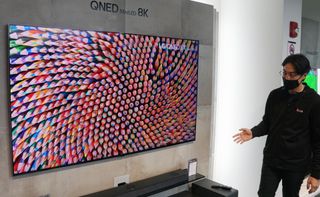
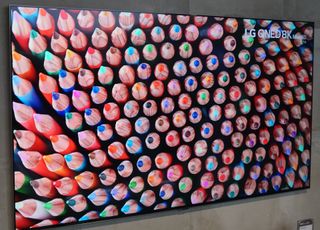
LCD displays still outsell OLED, which is why LG is also updating its 4K QNED line for 2022. They all feature updated Quantum Dot technology in which the Nano Cell is now an emissive layer. The crux of quantum dot is the clarifying of the light from Blue LED to running some through the Quantum Dots to run them green and then a Nano Cell layer that emits red light. LG claims a 90%+ DCI-P3 wide color gamut reproduction compared to the 70% coverage on traditional LED-LCD TVs.
The use of Mini LEDs gives the displays more discrete control of black levels and dampen haloing. Their 8K displays have 2,400 local dimming zones.
I took a look at a few of these new QNED sets and even though they’re not sporting 33 million pixels of resolution, the imagery is excellent. So much color, fantastic black levels, and excellent detail that holds up even from a foot away.
There are also a number of new entry-level UHD sets that use the slightly older a5 CPU but are at 56.7mm thinner than the previous generation Ultra HD sets and run the same WebOS and smart TV content and the more expensive OLED and QNED lines.
Pricing and availability details are expected in Q1.

A 38-year industry veteran and award-winning journalist, Lance has covered technology since PCs were the size of suitcases and “on line” meant “waiting.” He’s a former Lifewire Editor-in-Chief, Mashable Editor-in-Chief, and, before that, Editor in Chief of PCMag.com and Senior Vice President of Content for Ziff Davis, Inc. He also wrote a popular, weekly tech column for Medium called The Upgrade.
Lance Ulanoff makes frequent appearances on national, international, and local news programs including Live with Kelly and Mark, the Today Show, Good Morning America, CNBC, CNN, and the BBC.
Most Popular




